Key takeaways:
- Dyslexia impacts self-esteem and relationships, highlighting the need for understanding and support from family.
- Open communication about frustrations can lead to tailored support strategies, enhancing learning experiences.
- Family involvement, such as shared reading practices and celebrations of progress, fosters connection and resilience.
- Empathy and collaborative learning create a safe environment, allowing family members to support each other through challenges.
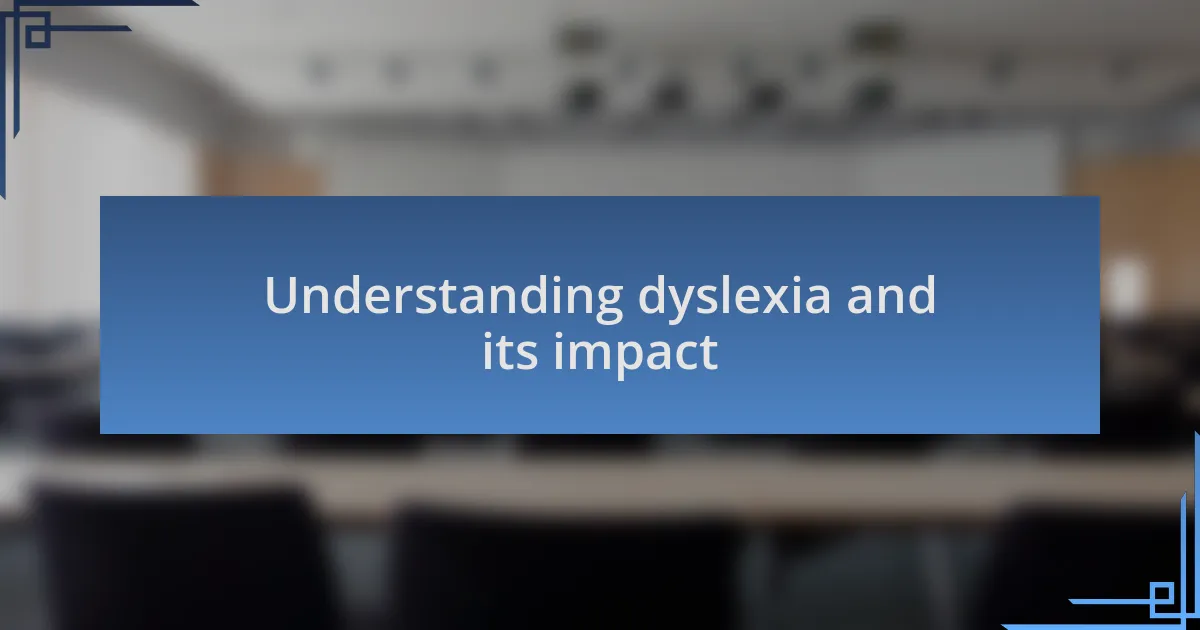
Understanding dyslexia and its impact
Dyslexia is not just a reading challenge; it deeply affects a person’s self-esteem and confidence. I remember feeling overwhelmed in school, often doubting my abilities while watching others read effortlessly. Have you ever felt that sinking feeling of comparison? It lingers, and I often wonder how many others felt the same way but didn’t speak up.
As I navigated through my own experiences with dyslexia, I realized it impacts not only academic performance but also relationships with family and friends. There were countless evenings spent trying to decipher a simple text while my family offered support, but I couldn’t shake the frustration. Can you really put a price on the emotional strain that comes with feeling “different”?
The journey through dyslexia involves understanding the unique cognitive strengths that come with it, such as creative problem-solving and resilience. I’ve learned to celebrate those moments of clarity, where my thoughts flow freely, making the struggle feel worthwhile. Isn’t it fascinating how embracing these differences can lead to profound personal growth?
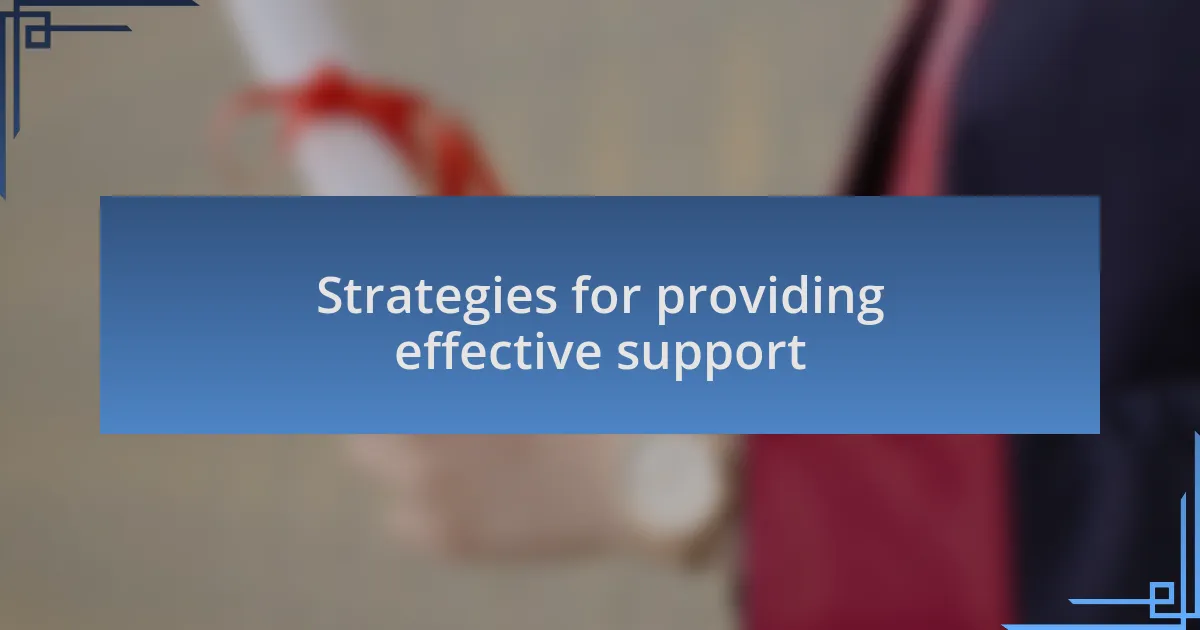
Strategies for providing effective support
Effective support for individuals with dyslexia hinges on personalized strategies that address their unique challenges. I recall a time when my family transitioned from simply offering help with homework to acknowledging my specific needs. This shift made all the difference, as they began to ask, “What do you really need from us?” It encouraged an open dialogue that fostered understanding and tailored support.
Open communication is vital. I remember reaching out to my parents to express my frustrations and sharing that I often felt lost during reading exercises. This moment of honesty led to them researching specific resources and techniques that aligned better with my learning style. Have you ever experienced that relief when someone truly listens? It’s transformative, and it can inspire the entire family to be proactive in finding the right tools and environments for growth.
Another powerful strategy is creating a structured routine that incorporates breaks and engaging learning activities. I found that mixing reading sessions with creative exercises—like drawing or storytelling—helped me retain information better. Have you tried blending fun with learning? It’s a game-changer, and it strengthens both understanding and family bonds as everyone becomes part of the journey.
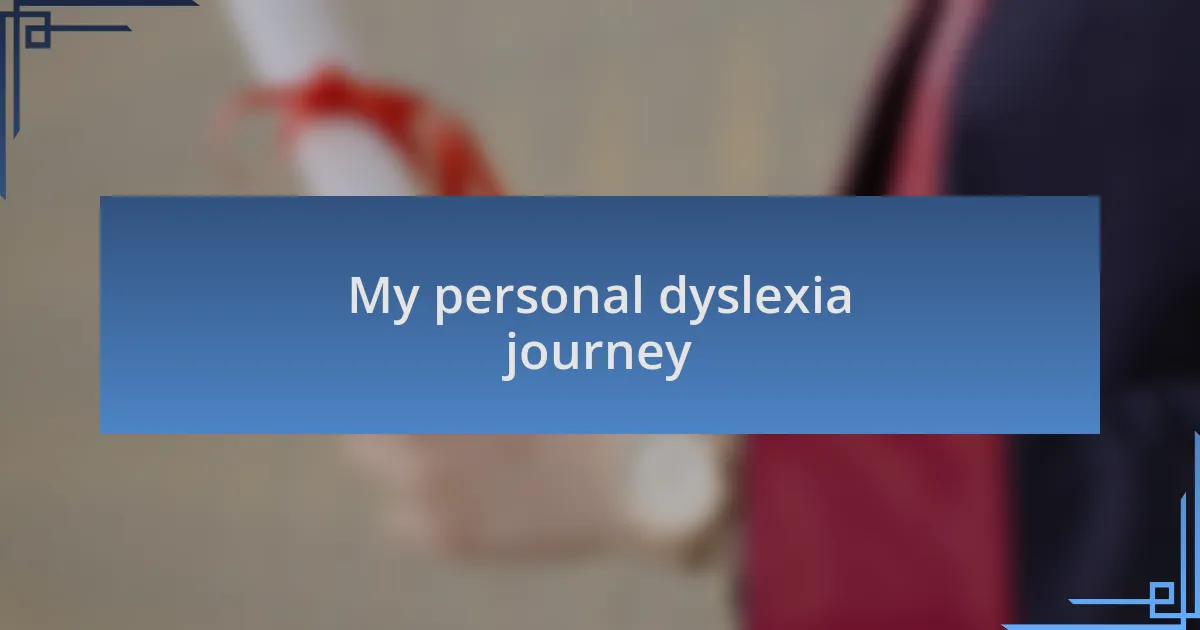
My personal dyslexia journey
Navigating my dyslexia journey wasn’t just about overcoming academic challenges; it was also a deeply emotional experience. I vividly remember the late nights spent in frustration, surrounded by textbooks that seemed to speak a foreign language. In those moments, my family would often sit beside me, offering quiet encouragement. Their presence alone reminded me that I was never alone in this struggle. Have you ever felt that sense of solidarity? It can make even the toughest obstacles seem more manageable.
There was a time when I came home from school feeling defeated after another difficult reading assignment. I had shared my feelings with my sister, who, rather than offering typical reassurances, suggested we read aloud together—a practice that turned into a cherished routine. As we took turns with the words, I could hear the confidence in my voice growing. Isn’t it fascinating how a simple change in approach can uplift both spirits and learning? This experience not only helped improve my reading skills but also created a stronger bond between us, reinforcing the importance of support in journeys like mine.
Reflecting on my experiences, I can’t help but appreciate the moments of small victories. One instance that stands out to me was finally understanding a passage that had once felt impossible. I was bursting with excitement, and my family celebrated with me. They understood that it wasn’t just about the words on the page; it was about feeling valued and acknowledged. Have you ever celebrated a victory that seemed small to others but meant the world to you? Those moments have taught me that family support is powerful and essential, providing the encouragement needed to face each new challenge ahead.
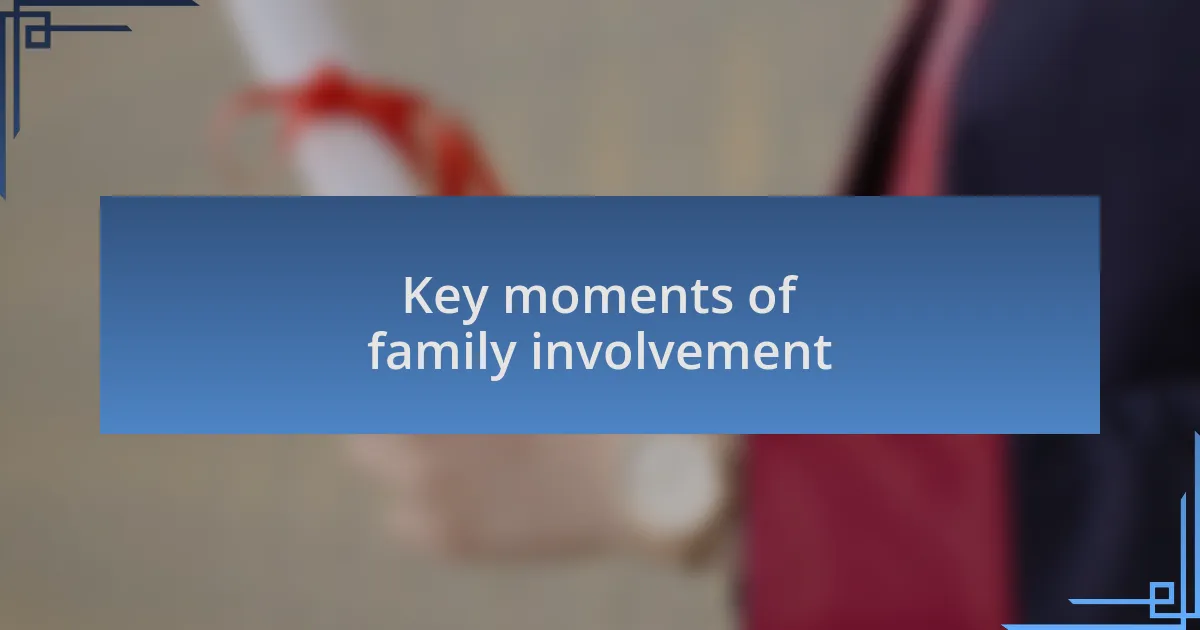
Key moments of family involvement
The role my family played during my journey was pivotal, especially during times of transition. I remember one specific afternoon when my parents organized a family meeting to discuss my learning progress. They openly shared their own struggles with reading during childhood, which made me feel a sense of belonging. Have you ever realized that the people closest to you faced challenges similar to yours? This shared vulnerability created a support system that felt both strong and intimate.
Another memorable moment occurred during a school event, where I was expected to present a project. The dread of standing in front of my peers had me on edge, but my brother stepped in, volunteering to practice with me late into the night. Together, we transformed the pressure into a collaborative effort filled with laughter and encouragement. I still remember the relief I felt when I finally presented my work; it felt less daunting than I imagined. Isn’t it amazing how teamwork can shift your perspective?
One crucial evening, my parents decided to celebrate my progress by throwing a small family gathering. We shared stories about my journey and highlighted the efforts I had put in, which made me feel seen and appreciated. In that moment, the struggles seemed to diminish, replaced by a warm sense of love and pride. Have you ever felt that warmth from those who truly understand your journey? It’s these instances of recognition that can fuel motivation and resilience, reminding us that we are not alone in our battles.
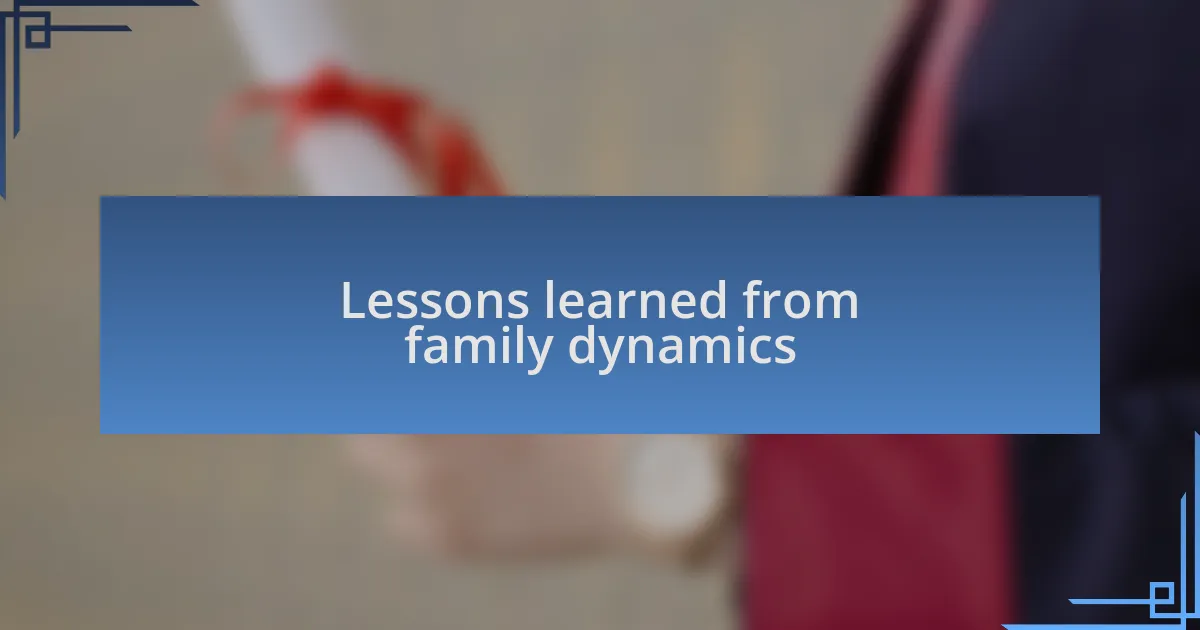
Lessons learned from family dynamics
Family dynamics often teach us invaluable lessons about support and understanding. For instance, I realized the power of empathy one evening when my sister confided in me about her own anxiety regarding school. Listening to her struggles gave me a fresh perspective; it made me appreciate how our experiences can intertwine, creating a bond that deepens our connection as siblings. Have you ever felt that moment of clarity when someone else’s vulnerability mirrors your own?
During countless family dinners, I noticed how remarks about reading would shift from teasing to support as we all matured. One night, my father shared a heartfelt story about his own difficulties with dyslexia, stating that it never defined him. This revelation made me reflect on my own journey. Isn’t it fascinating how parents can be our greatest teachers, even when we least expect it?
Another significant lesson emerged during family game nights. I often struggled with game rules and instructions, and instead of frustration, my family demonstrated patience. This taught me that learning isn’t just about mastering material; it’s about collaboration and creating a safe space for mistakes. Haven’t you ever wished to be in an environment where you could embrace the process without fear?
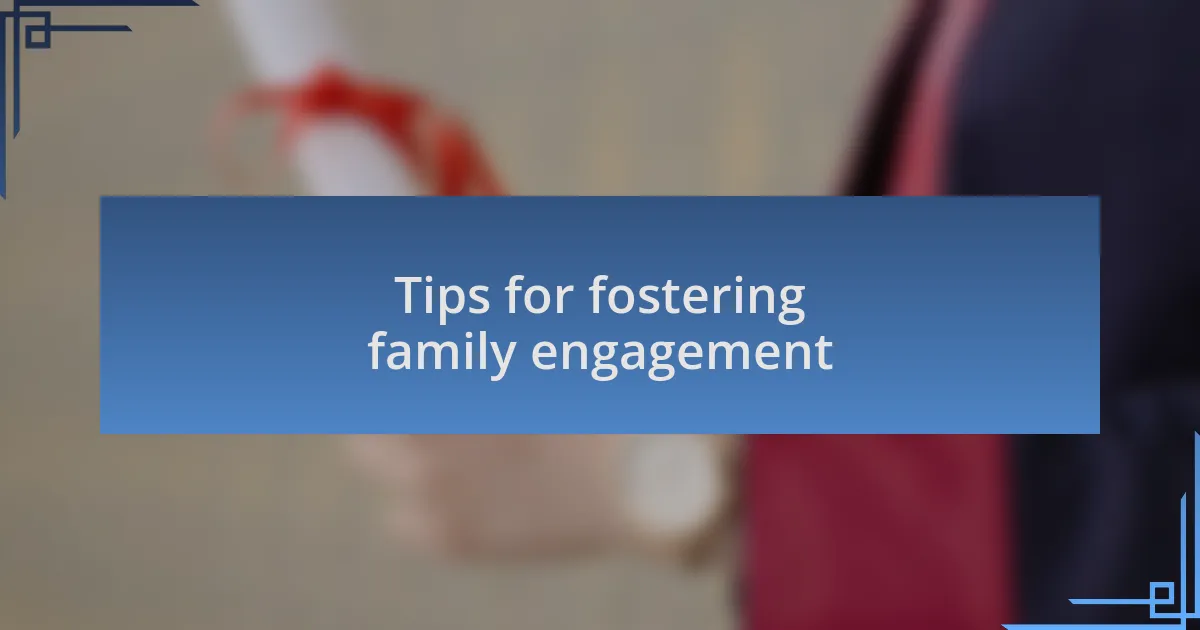
Tips for fostering family engagement
To foster family engagement, it’s crucial to create an open atmosphere where everyone feels comfortable sharing their thoughts and feelings. I remember one weekend when we decided to have a family brainstorming session about my learning challenges. It surprised me how openly my family discussed their own experiences. Isn’t it powerful when we realize that we all struggle with something?
Another effective strategy is to involve everyone in the learning process actively. I once set up a simple reading challenge with my family, where we each picked a book and shared what we learned. This not only made reading fun but also turned discussions into a platform for support. Have you thought about how gamifying learning can bring your family closer together?
Lastly, celebrating small victories can significantly boost everyone’s morale. I vividly recall the moment I completed a challenging book I had been struggling with for weeks. My family threw a mini-celebration just for me, complete with silly certificates and cheers. Honestly, it felt wonderful to be recognized for my effort, even in something that seemed small. How often do we take a moment to acknowledge progress, no matter how minor it seems?